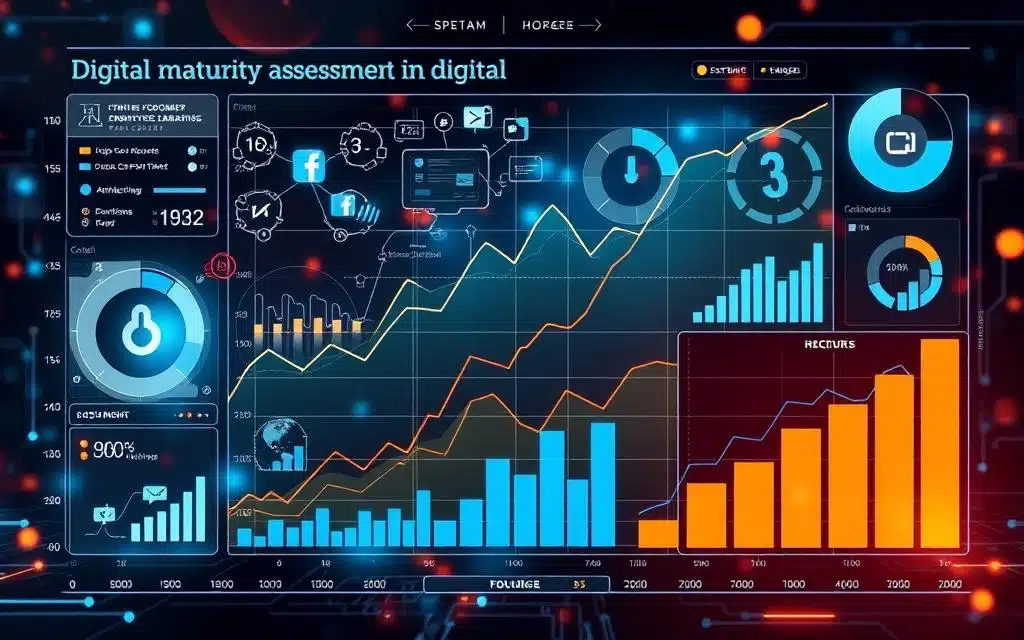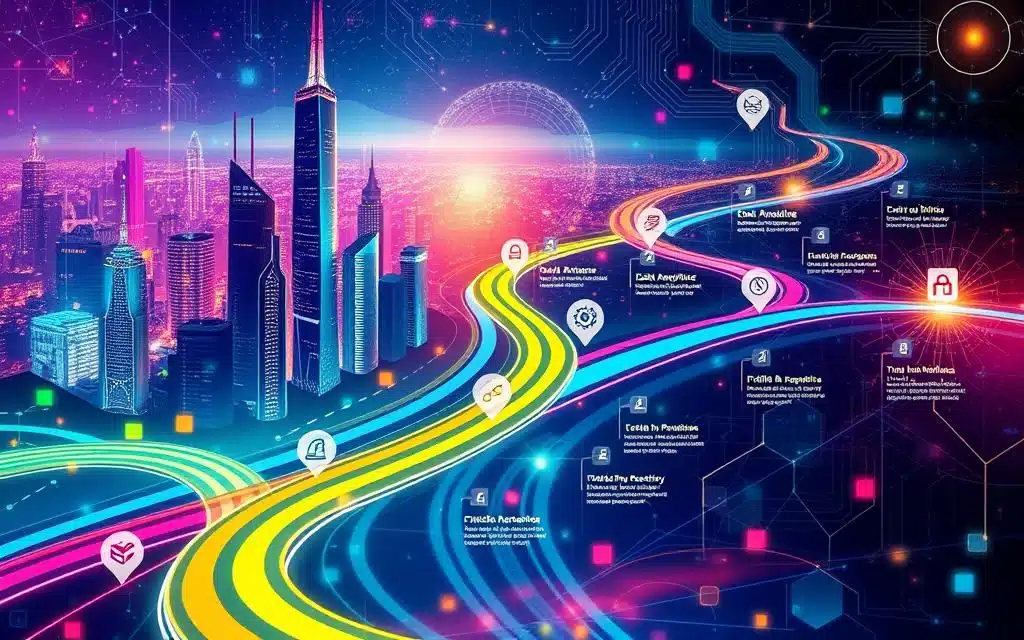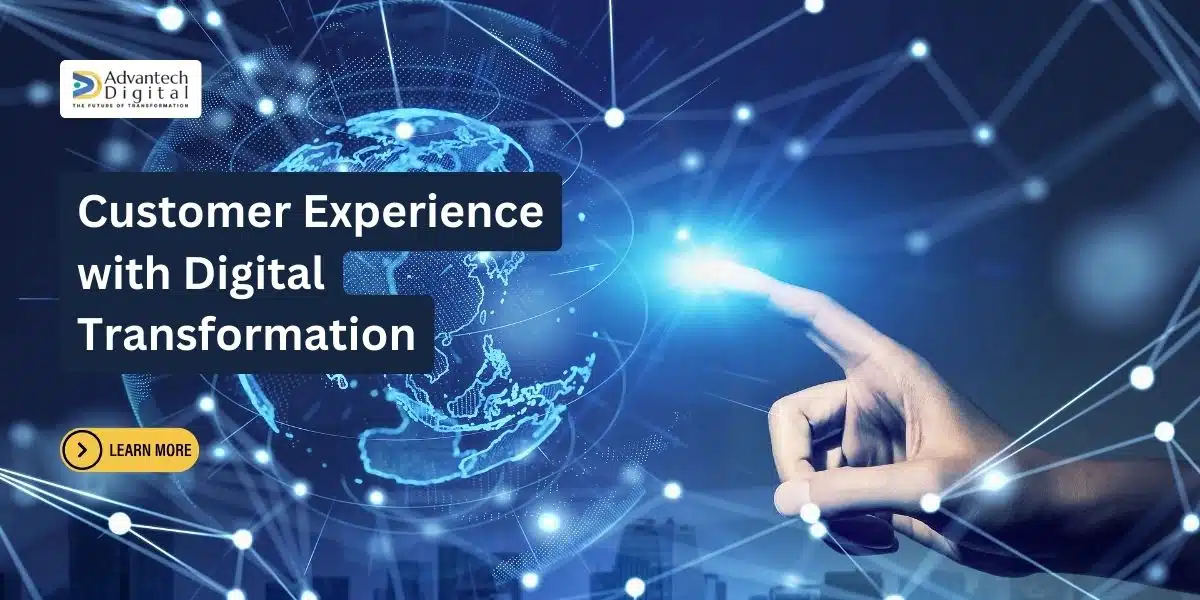Struggling to keep up with the evolving digital landscape in marketing? Wondering how to integrate digital technologies into your strategies effectively? This guide explores digital transformation strategies in marketing that can revolutionize your marketing efforts.
Digital transformation is more than adopting new technologies. It’s a fundamental shift in business operations and customer value delivery. This change requires a digital-first culture and continuous adaptation to the digital ecosystem.
A successful transformation can unlock new opportunities. It enhances customer experiences and drives business growth. By embracing this journey, you can position your business for success in the digital age.
This guide covers essential components of a successful digital transformation strategy in marketing. We’ll explore the importance of digital transformation and developing an implementation roadmap. You’ll learn how marketing automation can streamline processes and enhance efficiency.
We’ll also discuss creating omnichannel experiences that delight customers. Fostering a culture of innovation within marketing teams is another crucial aspect we’ll cover.
Key Takeaways
- Digital transformation is a strategic integration of digital technology to fundamentally change business operations and deliver customer value.
- A digital-first culture is essential for successful digital transformation in marketing.
- Marketing automation can streamline processes and enhance efficiency.
- Creating omnichannel experiences is crucial for delivering seamless customer journeys.
- Fostering a culture of innovation within marketing teams is key to staying ahead in the digital era.
Prepare to reshape your marketing strategies for the digital age. This transformative journey will position your business for success. Let’s explore the power of digital transformation in marketing together.
Understanding Digital Transformation in Marketing
Businesses must embrace digital transformation to stay competitive in today’s evolving digital landscape. It involves using digital technologies to create or modify marketing processes and customer experiences. This approach helps companies meet changing business and market requirements.
By adopting a customer-centric approach and using digital tools, companies can gain a significant competitive advantage. This transformation allows businesses to reimagine how they engage with their target audience and optimize campaigns.
What is Digital Transformation?
Digital transformation uses technology to change how businesses operate and deliver value to customers. In marketing, it means rethinking audience engagement, data analysis, and campaign optimization. This can involve creating new technology or improving existing processes.
The COVID-19 pandemic has accelerated the need for digital transformation. Many organizations have expedited their efforts to stay relevant and competitive. This shift is crucial for businesses of all sizes.
The Importance of Digital Transformation in Marketing
For Chief Marketing Officers (CMOs), digital transformation is a top priority. It allows teams to thrive in the digital era. By investing in the right technologies, CMOs can position their teams for success.
- Improved customer experience: We can deliver personalized experiences by using data and digital tools to understand customer needs.
- Enhanced data-driven decision-making: Digital transformation enables us to collect and analyze vast amounts of data, informing our marketing strategies.
- Increased agility and responsiveness: Adopting agile methodologies and real-time data helps us quickly respond to market trends and consumer feedback.
Successful digital transformation in marketing requires focus on key areas. These include content marketing, automation, paid advertising, and social media. Enhancing overall customer experience is also crucial.
Building a tech-savvy team and investing in the right technologies are essential. Fostering collaboration and innovation will position organizations for long-term success in the digital age.
Assessing Your Current Digital Marketing Maturity
Evaluating your digital marketing maturity is crucial before embarking on a transformation strategy. This process involves analyzing your technology infrastructure and current processes. A gap analysis helps identify areas for improvement.
Research shows that 70% to 85% of digital transformations fail to meet their objectives. A thorough digital maturity assessment can help avoid this outcome. Smart Insights offers various models for assessing marketing skills across different areas.
The digital marketing maturity model spans several stages. Organizations at the nascent stage have limited digital channel use and basic websites. They infrequently use social media and lack data analytics.
Challenges at this stage include low online visibility and ineffective marketing campaigns. Measuring the impact of digital efforts also proves difficult.
“Digital transformation is not just about adopting technology but fundamentally reshaping how businesses operate.”
At the emerging stage, organizations develop an active presence on multiple digital channels. They improve their websites with basic SEO and content marketing. Regular use of social media and email marketing begins.
Key strategies at this stage include content marketing, SEO and SEM optimization. Email campaigns and basic analytics usage also become important.
| Digital Maturity Stage | Characteristics | Key Strategies |
|---|---|---|
| Nascent | Limited digital channels, basic website, infrequent social media use, little to no analytics | Improve online visibility, optimize website, increase social media presence |
| Emerging | Active on multiple channels, improved website with SEO and content, regular social media and email use, initial analytics | Content marketing, SEO/SEM optimization, email campaigns, basic analytics |
| Optimized | Cohesive strategies across channels, advanced SEO, content, and social media, data-driven decisions, effective lead nurturing and conversion | AI/ML for optimization, personalized campaigns, continuous innovation, customer experience focus |
Organizations in the optimized stage have cohesive digital marketing strategies across all channels. They make data-driven decisions and effectively nurture and convert leads. Advanced strategies involve AI and machine learning for optimization.
Highly personalized campaigns and continuous innovation are key at this stage. A strong focus on customer experience and satisfaction is also crucial.
A comprehensive SWOT analysis and gap analysis provide clarity on current digital marketing maturity. This understanding helps develop a roadmap for achieving desired digital transformation. Setting realistic goals and allocating resources effectively become possible through this process.
Setting Clear Digital Transformation Goals and Objectives
A well-defined roadmap with clear goals is crucial for digital transformation success. Aligning these goals with business strategy ensures initiatives contribute to growth and profitability. Let’s explore the importance of setting goals and defining key performance indicators (KPIs).
Aligning Digital Transformation with Business Strategy
Digital transformation goals must align with the company’s overall strategy. This ensures digital initiatives are integral to the organization’s growth plan. By 2023, digital transformation spending is projected to exceed 50% of all ICT investment.
A Gartner study found 56% of CEOs saw improved profits after implementing digital improvements. This highlights the importance of aligning digital transformation with business objectives for tangible results.
Defining Key Performance Indicators (KPIs)
Establishing KPIs is crucial to measure digital transformation success. These metrics help track progress, identify improvement areas, and drive data-based decisions. Common KPIs include customer satisfaction rates, operational efficiency improvements, and revenue growth from digital channels.
- Customer satisfaction rates
- Operational efficiency improvements
- Revenue growth attributable to digital channels
- Employee productivity and engagement
Digitalist Magazine reports 50% of companies view data analytics as the top technology enabling change. The Internet of Things ranks second at 42%, while 40% prioritize AI and machine learning.
These statistics emphasize the importance of leveraging data and emerging technologies in digital transformation. They also highlight the need to measure impact through relevant KPIs.
Successful digital transformations often focus on optimized customer experiences, reduced costs through efficiency gains, improved insights through data analytics, connecting data vendors for better decision-making, increasing agility, and enhancing internal communication processes.
Setting clear goals, aligning them with business strategy, and defining relevant KPIs creates a solid foundation for digital transformation. This approach ensures initiatives contribute to overall business growth and success.
Developing a Roadmap for Digital Transformation in Marketing
Businesses must develop a comprehensive roadmap to navigate digital transformation in marketing. This strategic guide outlines key initiatives, timelines, and resource allocation. A well-structured roadmap ensures a phased approach, minimizing disruption and maximizing ROI.
A recent survey shows 89% of companies have adopted or plan to adopt a digital-first strategy. However, only 16% of digital transformations in tech-centric industries achieve their objectives. To succeed, businesses must prioritize digital initiatives based on impact and feasibility.
Prioritizing Digital Initiatives
Prioritize initiatives based on potential impact and estimated implementation effort. Focus on high-impact, low-effort initiatives first to generate quick wins. The SIPOC diagram tool can help map high-level processes and identify areas for improvement.
Creating a Timeline for Implementation
Create a realistic timeline for implementation, considering initiative dependencies, resource availability, and potential roadblocks. Break down the journey into manageable phases with clear milestones and deliverables. This approach allows businesses to track progress, celebrate successes, and make necessary adjustments.
Allocating Resources and Budget
Digital transformation projects require significant investment in time, money, and human resources. Allocate resources and budget wisely. This may involve hiring new talent, partnering with external consultants, and investing in new technologies.
Remember that digital transformation is an ongoing process. Businesses must continually invest in their digital capabilities to stay competitive.
By developing a comprehensive roadmap, businesses can navigate the complexities of digital transformation in marketing. Prioritizing initiatives, creating realistic timelines, and allocating resources effectively will help companies become industry leaders.
Embracing Emerging Technologies in Marketing
Marketers must adapt to the rapid digital landscape by embracing new technologies. AI-powered marketing, data-driven insights, and immersive experiences give businesses a competitive edge. These tools help deliver exceptional value to target audiences.
ChiefMartec reports over 10,000 marketing technologies available. Yet, Google Marketing finds only 2% of businesses effectively use data-driven marketing. This gap presents a significant opportunity for companies to stand out.
Artificial Intelligence (AI) and Machine Learning (ML)
AI and ML are revolutionizing marketing with personalized experiences and predictive analytics. Machine learning algorithms boost customer engagement and conversion rates. Predictive analytics anticipate consumer behavior and market trends.
AI-driven attribution models and ML-powered media buying create revenue opportunities. These technologies also enhance customer retention efforts. Advanced tools enable data-driven decision making across marketing strategies.
Big Data and Analytics
Big data and analytics are crucial in modern marketing. They provide deep insights into consumer preferences and behaviors. This enables businesses to make informed decisions and deliver targeted experiences.
IoT devices play a key role in collecting consumer behavior data. These insights help marketers refine their approaches and enhance their offerings.
| Technology | Benefits |
|---|---|
| AI and ML | Personalization, predictive analytics, data-driven decision making |
| Big Data and Analytics | Consumer insights, targeted experiences, strategy optimization |
| AR and VR | Immersive experiences, virtual product try-ons, enhanced engagement |
Augmented Reality (AR) and Virtual Reality (VR)
AR and VR are reshaping consumer interactions with brands and products. These technologies enable immersive experiences that captivate audiences and drive engagement. Many industries benefit from virtual product try-ons through AR in marketing.
Virtual environments allow customers to visualize products before purchase. This approach can increase conversions, reduce returns, and strengthen brand connections.
Digital marketing transformation in the South African context revolves around customer centricity, tech enablement, and data-driven decision-making in marketing approaches.
Marketers must adopt these technologies to remain relevant and competitive. Harnessing AI, ML, big data, AR, and VR creates compelling, personalized experiences. These tools resonate with target audiences and drive business growth.
Transforming Customer Experience through Digital Channels
Businesses are revolutionizing customer experience using digital channels. They’re adopting omnichannel marketing to deliver seamless, personalized experiences across touchpoints. This approach enhances customer engagement and loyalty in the digital age.
AI and machine learning have transformed customer journey optimization. AI-powered analytics tools provide deep insights into customer preferences and behavior. Companies can now tailor services to meet unique customer needs, fostering stronger relationships.
Automation has significantly improved customer experience. AI-powered chatbots and self-service solutions empower customers to resolve issues independently. This reduces wait times and improves efficiency. Real-time analytics allow businesses to quickly adjust services based on customer feedback.
Investing in customer experience yields impressive results. Companies focusing on this area can see up to an 80% increase in revenue. Personalized experiences also boost customer loyalty. Studies show 61% of consumers are willing to spend more on customized experiences.
| Digital Transformation Initiative | Customer Experience Benefit |
|---|---|
| Omnichannel Marketing | Seamless experiences across touchpoints |
| AI-Powered Analytics | Deep insights into customer preferences |
| Automation & Self-Service | Efficient issue resolution and reduced wait times |
| Personalization | Increased customer loyalty and willingness to spend |
“The customer’s perception is your reality.” – Kate Zabriskie
Prioritizing customer experience is crucial in today’s digital landscape. Embracing digital transformation and leveraging omnichannel marketing builds lasting customer relationships. This approach helps brands thrive in the competitive marketplace.
Fostering a Culture of Digital Innovation in Marketing Teams
In today’s digital landscape, fostering innovation within marketing teams is vital for staying competitive. Embracing agile methods and continuous learning creates an environment that encourages experimentation and collaboration. This approach promotes creative problem-solving and keeps teams ahead of the curve.
Studies reveal impressive benefits of fostering digital innovation. Companies doing so are 47% more likely to exceed marketing goals. They also experience a 63% higher customer satisfaction rate. Innovation training boosts creative idea generation by 38%.
Organizations encouraging experimentation are 56% more likely to introduce groundbreaking digital marketing strategies. These stats highlight the importance of nurturing an innovative culture in marketing teams.
To build a thriving digital innovation culture, marketing teams should:
- Encourage experimentation and risk-taking
- Create a safe space for sharing ideas
- Foster collaboration across different functions and departments
- Utilize agile methodologies for improved efficiency and adaptability
- Recognize and reward innovative contributions
Tools like Slack, Trello, and Asana facilitate cross-functional communication and streamline workflow management. Adopting agile methodologies improves collaboration within marketing teams. This leads to increased efficiency and higher quality work.
| Strategy | Impact |
|---|---|
| Encourage experimentation | 56% more likely to introduce breakthrough strategies |
| Invest in innovation training | 38% increase in creative idea generation |
| Foster collaboration | 42% improvement in campaign execution speed |
| Recognize and reward innovation | 67% higher employee retention rate |
As Brené Brown once said, “Vulnerability is the birthplace of innovation, creativity, and change.” Embracing vulnerability and continuous learning unlocks marketing teams’ full potential. This approach, combined with agile methods, drives transformative digital innovation.
Measuring the Success of Digital Transformation Strategies in Marketing
Tracking digital transformation metrics is crucial for optimizing marketing strategies. These insights help businesses make data-driven decisions and improve performance. By monitoring key indicators, companies can evaluate their initiatives’ effectiveness and make necessary adjustments.
Studies show that digitally transformed companies are 26% more profitable than their peers. To achieve this, businesses must align their strategies with core objectives. These may include boosting online sales, enhancing customer loyalty, or improving operational efficiency.
Tracking Key Metrics and KPIs
Several vital metrics and KPIs are used to measure digital transformation success in marketing. These indicators provide valuable insights into various aspects of business performance.
- Customer acquisition and retention rates through digital channels
- Net Promoter Score (NPS) and customer satisfaction levels
- Employee engagement scores and productivity rates
- Process completion time, cost savings, and overall productivity improvements
- Number of new products/services launched and adoption rate of new technologies
Monitoring these digital transformation metrics helps assess the impact on customer experience and employee engagement. It also provides insights into operational efficiency and innovation within the organization.
“A successful shift in a digital transformation journey depends on achieving business core objectives such as increased sales, better customer loyalty, or enhanced efficiency.”
Continuously Optimizing and Iterating
Digital transformation requires ongoing optimization and iteration. Regular data analysis and feedback gathering help identify areas for improvement. This approach allows businesses to make necessary adjustments to their strategies.
For example, low customer retention rates may signal the need to reevaluate digital platform user experiences. If employee productivity lags despite new digital tools, additional training or process refinements might be necessary.
Embracing continuous improvement and data-driven decision-making is essential for success. This approach ensures that digital transformation strategies remain effective and aligned with market trends. It also helps meet evolving customer expectations in a rapidly changing business landscape.
Overcoming Challenges in Implementing Digital Transformation Strategies
Digital transformation presents numerous obstacles for organizations. Nearly 70% of these initiatives fail, making it crucial to address challenges head-on. Understanding these hurdles is key to successful implementation of digital strategies.
Resistance to change within organizational culture is a significant barrier. Employees may fear new technologies and processes, clinging to the familiar. Effective change management is essential to overcome this resistance.
Open communication, training, and employee involvement can foster a culture embracing change. These strategies help mitigate fears and encourage adaptation to new systems.
Change Management and Employee Adoption
A strategic approach to change management is vital. Assembling a cross-functional team for change leadership promotes collaboration. This team should include representatives from various departments, ensuring all stakeholders have a voice.
Hiring digital technology experts can bridge skill gaps within the organization. This expertise is crucial for successful implementation of new systems.
Effective planning and execution are key to digital transformation success. This involves making informed decisions on technologies and allocating resources appropriately. Setting timelines, defining milestones, and maintaining clear communication are also essential.
Integration with Legacy Systems
Integrating new technologies with existing legacy systems poses a significant challenge. Many organizations rely on deeply entrenched systems that have been in place for years. Balancing functionality of legacy systems with new technology benefits can be daunting.
“Legacy system integration is a critical component of successful digital transformation. It requires careful planning, technical expertise, and a phased approach to ensure a smooth transition.”
Overcoming this challenge requires a thorough assessment of existing systems. Organizations must identify areas where integration is feasible and beneficial. Collaborating with experienced technology partners can provide valuable insights and expertise.
A phased approach to modernization can minimize disruptions to operations. Prioritizing critical integrations allows for gradual system updates while maintaining functionality.
Continuous monitoring of digital transformation initiatives is crucial. Tracking progress against KPIs, gathering feedback, and making adjustments ensure long-term success. Regular assessment and openness to improvements are key to effective digital transformation.
Conclusion
Digital transformation is crucial for businesses to stay competitive in today’s market. It offers benefits like data-driven decisions, customer focus, and seamless integration across channels. These advantages help marketers understand customers better and provide personalized experiences.
Content marketing thrives with digital transformation. It attracts organic traffic, builds relationships, and establishes industry authority. AI and machine learning enhance marketing by automating tasks and improving customer interactions. Spotify’s success in personalization serves as an inspiring example for others.
Remember, digital transformation is an ongoing process. It requires constant adaptation as technology and customer expectations evolve. Companies must stay flexible and open to change to maintain their competitive edge.
Regular assessment of marketing maturity is essential. Investing in the right tools and talent fosters innovation. This approach helps organizations stay ahead in the dynamic digital landscape.
Digital transformation is now a necessity, not an option. Effective strategies unlock new opportunities and drive growth. They create lasting value for customers and organizations alike.
FAQ
What is digital transformation in marketing?
Digital transformation in marketing integrates technology to revolutionize business operations and customer value delivery. It leverages digital tools to modify or create new marketing processes. This transformation aims to meet evolving business and market demands.
Why is digital transformation important for businesses?
Digital transformation is vital for businesses to remain competitive in our digital-centric world. It enhances efficiency, decision-making, and customer satisfaction. Companies that ignore this shift risk losing market share and becoming obsolete.
How can businesses assess their current digital marketing maturity?
To gauge digital marketing maturity, businesses should evaluate their technology infrastructure and current processes. A gap analysis helps identify areas for improvement. Understanding the present state guides steps towards the desired digital vision.
What are the key components of a successful digital transformation strategy?
A successful strategy aligns clear objectives with overall business goals. It includes an implementation roadmap and embraces emerging technologies. Transforming customer experience and fostering innovation are crucial.
Continuous measurement and optimization of performance complete the strategy. These elements ensure a comprehensive approach to digital transformation.
How can businesses leverage emerging technologies in marketing?
Marketers must embrace AI, machine learning, big data analytics, and augmented reality. These technologies enable personalized experiences and predictive analytics. They help businesses gain a competitive edge and deliver superior customer experiences.
What role does customer experience play in digital transformation?
Customer experience is central to digital transformation in marketing. It involves optimizing the customer journey across all touchpoints. Businesses use data to understand preferences and engage customers through their preferred channels.
How can businesses foster a culture of digital innovation in marketing teams?
Successful digital transformation requires a culture embracing change and innovation. Marketing teams should adopt agile methodologies and encourage experimentation. Prioritizing continuous learning and providing necessary skills and tools drive transformation from within.
What metrics should businesses track to measure the success of digital transformation strategies?
Tracking key metrics is crucial for ongoing improvement. Businesses should monitor customer satisfaction, engagement rates, and conversion rates. Revenue growth is also important. Using data for informed decisions ensures long-term success.
What challenges do businesses face when implementing digital transformation strategies?
Challenges include resistance to change, integration with legacy systems, and skill gaps. Effective change management and clear communication are essential. Employee training helps ensure successful adoption.
Businesses must navigate the complexities of integrating new technologies with existing systems. This ensures a smooth transition during the transformation process.
How can businesses ensure the long-term success of their digital transformation efforts?
Digital transformation requires continuous evolution and adaptation. Businesses must regularly assess their strategies, technologies, and processes. Staying agile and embracing innovation are key to long-term success.
Prioritizing customer needs helps businesses thrive in the ever-changing digital landscape. This approach ensures sustained growth and relevance.

















2 thoughts on “The Ultimate Guide to Digital Transformation Strategies in Marketing”
Comments are closed.